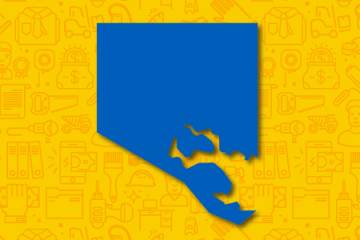As a volunteer at Health Care for the Homeless, Serena Wang, a Johns Hopkins junior majoring in public health studies, met people who wanted to improve their lives by getting jobs but didn't know how to go about it.
"I realized that there were large barriers for many of the clients to not only access the technology required to apply for jobs, but also to have the transportation and even simply the knowledge of how to write a resume and cover letter," Wang wrote in a pitch she developed with two co-leaders and submitted to Idea Lab, the Johns Hopkins crowdsourcing platform.
That pitch included providing career workshops, technology and training, interview attire, and transportation to individuals in partnership with Health Care for the Homeless, and creating an online hub for information about services available throughout Baltimore City. Now the team will receive $20,000 to put their plan into action after they received 884 online votes from the JHU community, the most for any idea in the Idea Lab's Ten by Twenty challenge category.
This year—Idea Lab's fifth—11 projects have been selected by popular vote to receive funding from a total of 46 submitted ideas. The proposals solicited this year fell under three challenges: to support the university's Ten by Twenty goals, enhance diversity and inclusion efforts, or advance sustainability efforts. More than 3,900 students, faculty, and staff from every school and division in the Johns Hopkins community participated, casting about 8,500 total votes.
"When we launched the Ten by Twenty, we knew the passion and creativity of our students, faculty, and staff would be vital to reaching our goals," JHU President Ronald J. Daniels said. "Over five years of calling for impactful ideas through the Idea Lab, the outpouring of thoughtful proposals—and the care they demonstrate for our institution, our communities, and our neighbors—has been truly remarkable."
Ten by Twenty Challenge
The Ten by Twenty Challenge offered up to $20,000 for ideas that support the university vision of 10 goals to be reached by 2020. In past years, the challenge usually focused on one area of that vision, but this year participants were encouraged to make proposals related to any goal they chose.
The second idea selected by voters is Books and Brunch, which focuses on helping primary school students become proficient readers through events with authors and other guest speakers. Regular sessions in the summer and over school breaks will include socializing and food alongside reading and guided discussion.
This year, with Daniels' generous support, more Ten by Twenty Challenge submissions received funding than ever before. Additional winners chosen by university leadership are:
- Establishing the Johns Hopkins Disability Coalition, which aims to bring together stakeholders from across the university to address inequities for persons with disabilities within and outside the university. Efforts include hosting events, lectures, panels, and other awareness-raising activities.
- The Art Museum-Based Exploration of Pre-Health Professional Identity, which will invite pre-health studies students to participate in six learning sessions at the Baltimore Museum of Art.
- The Healthy Aging Project, which aims to collect information from older adults in order to better understand their needs and identify the best ways to communicate with them about emerging health practices.
- Creating a Community Biology Lab at JHU, in which the student-led organization Agara Bio will expand the events and activities it offers at a community wet-lab space where students can experiment with biology outside of the classroom or faculty-led lab.
Diversity Innovation Grants
Each year, the Diversity Leadership Council invites faculty, staff, and students from both the university and health system to submit proposals that will enhance diversity and inclusion at the institutions. The Homewood Facilities Operations Staff Yearbook earned the most votes, and with $2,500 in funding, the project team plans to hire students to create a publication that will share information about operations staff on the Homewood campus in order to boost morale and improve relationships and team building.
"Each year JHU operations members work very hard behind the scenes to keep the building system running and all interior/exterior space well-maintained for the faculty/students/staff members and the visitors," the proposal said. "It is the intent of the project to personalize each operations staff member beyond position titles to give voice and recognition to the often underappreciated part of our research and education mission."
Two other proposals also received funding:
Students for Disability Justice: Access & Equity at a Crossroads involves organizing a network of student groups related to disability, mental health conditions, and chronic illnesses. The group will create a listserv to share information, create an online listing of student groups, and organize a series of panel discussion on disability topics.
Student Gender Closet is a project that seeks to offer an on-campus location where those who are questioning their gender, transitioning, or gender queer can get clothes that make them feel comfortable and able to be themselves. The organizers will secure clothing and host pop-up locations until a permanent location can be established.
Sustainability Grants
Two teams have been selected to receive a grant from JHU Sustainability to implement ideas that engage the campus community and inspire action on environmental issues.
GreenHacks was awarded $5,000 to host a sustainability hackathon that will invite students, faculty members, sustainability organizations, and companies in the greater Baltimore area to collaborate and pitch innovative green technologies, business proposals, initiatives, or solutions. The idea earned 975 votes.
GreenHacks aims to address the global environmental crisis by "raising awareness of our society's sustainability problem and challenging individuals to develop tangible solutions to it," the proposal said. "This venture aims to spark innovation and design to address sustainability issues that affect life at personal, corporate, and societal levels."
The New Norm: Red Solo Cup Project received 880 votes and an award of $2,500. The startup of 15 undergraduate students created a machine that processes plastic into filament that can be woven into fabric. They plan to use their grant to coordinate with organizations around campus to collect plastic waste—in particular red solo cups from events—and continue to develop their machine and business plan.
Posted in University News
Tagged diversity, sustainability, ten by twenty, idea lab









